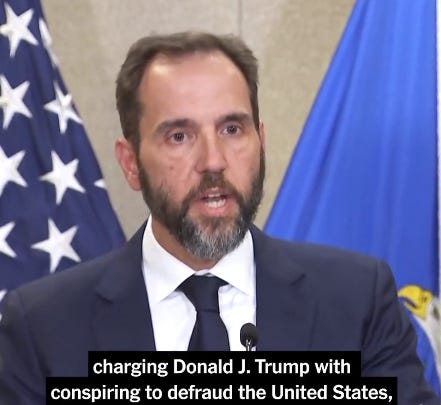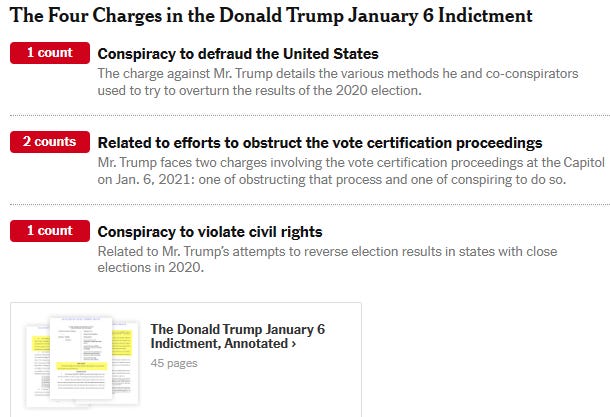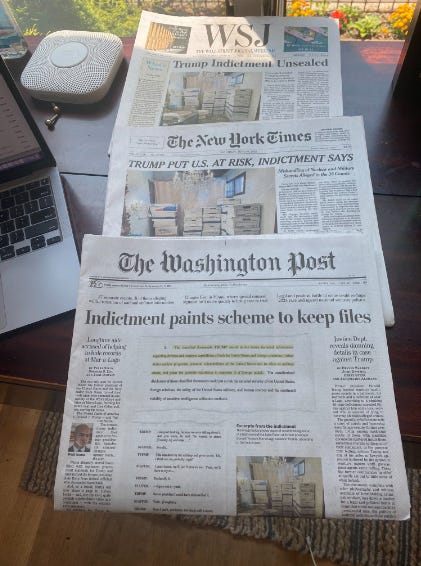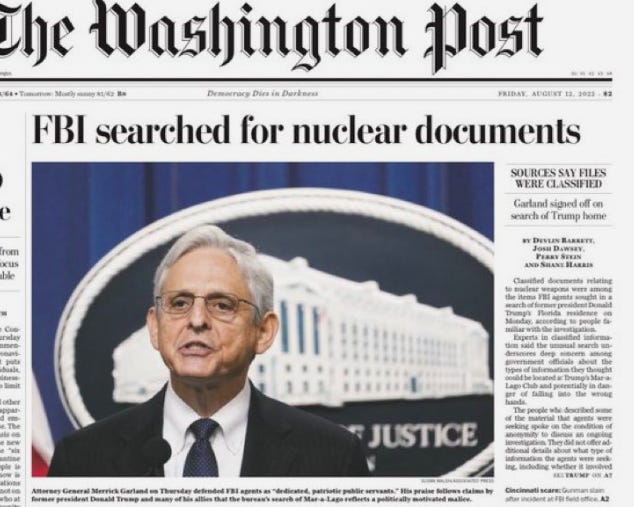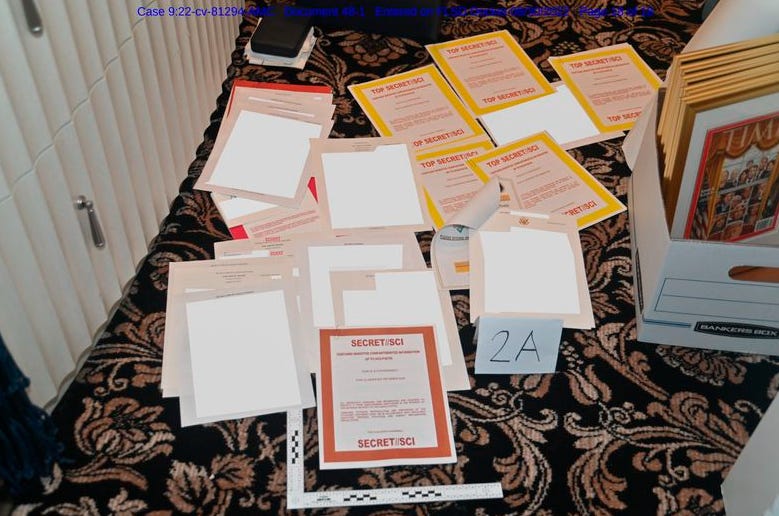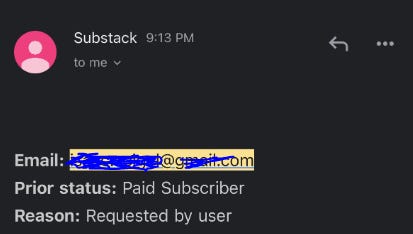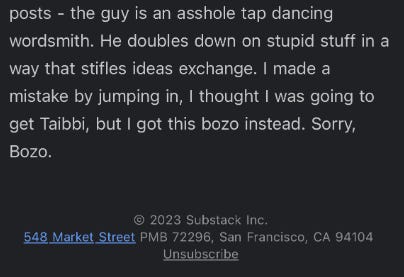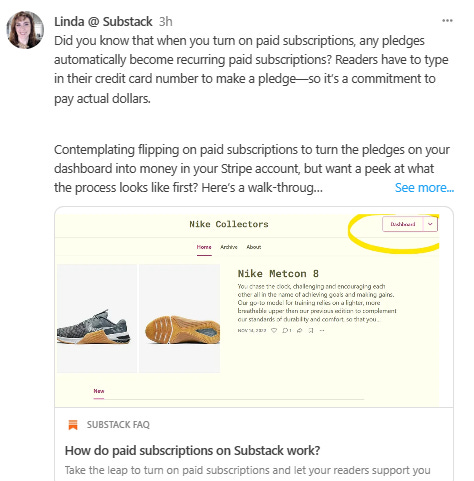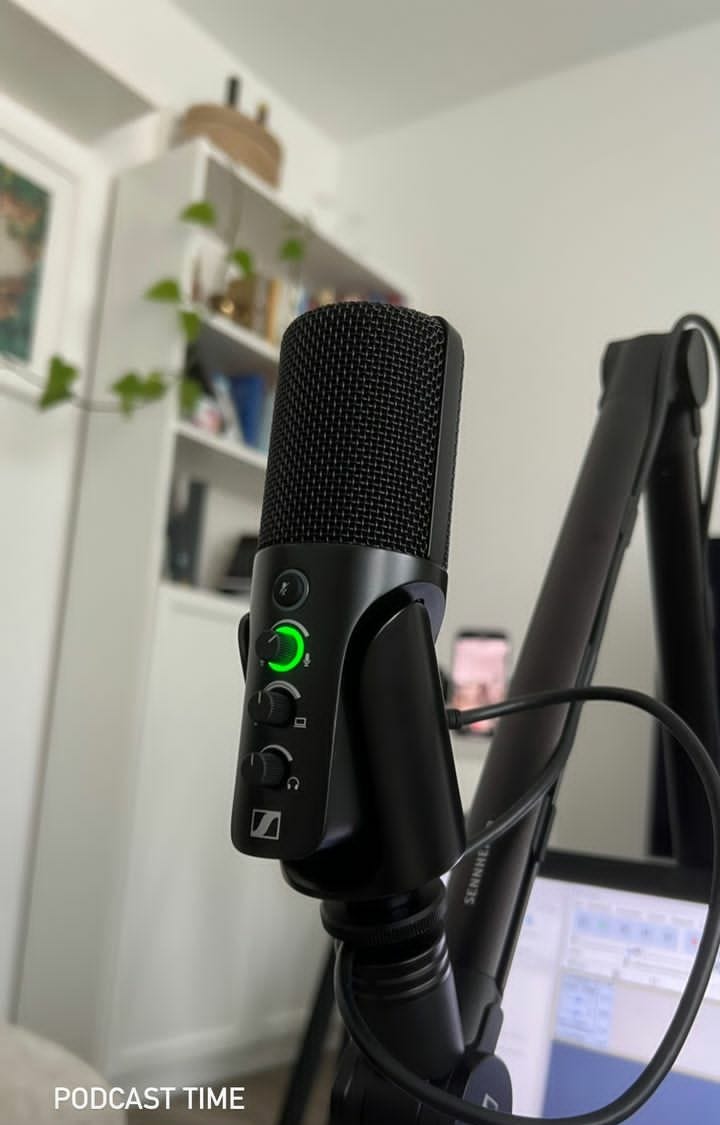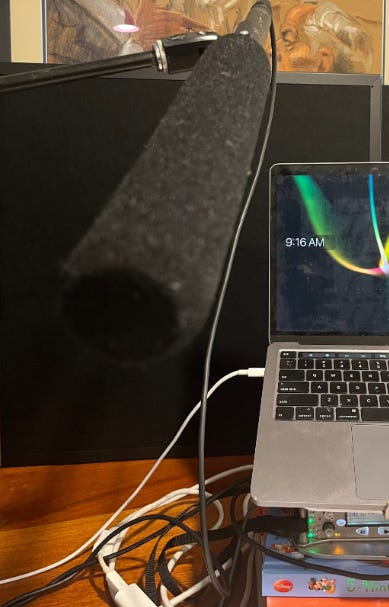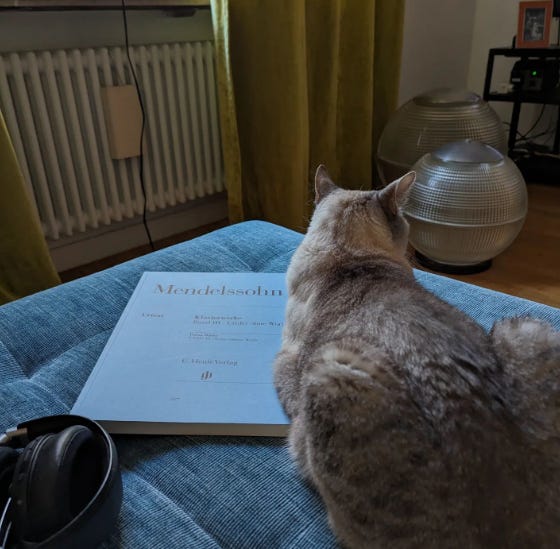DC 9.12pm
Jack Smith, the special counsel, charged former President Donald J. Trump with four criminal counts, involving three conspiracies related to Mr. Trump’s attempts to overturn the victory of Joseph R. Biden Jr. in the 2020 election.
If former President Donald J. Trump wins the presidency even as criminal charges against him still loom, a series of extraordinary complications would ensue.
The indictment on Tuesday on federal charges stemming from his attempts to remain in power after his 2020 election loss added to the mounting legal peril Mr. Trump, the front-runner for the Republican Party, faces as he campaigns for a second term in the White House.
In New York, he is accused of falsifying business records in connection with a hush money payment while the special counsel, Jack Smith, also previously accused Mr. Trump of mishandling national security secrets.
Were a federal case to still be pending on Inauguration Day, Mr. Trump could simply use his power as president to force the Justice Department to drop the matter, as he has suggested he might do.
(It is not yet clear when a trial over his efforts to overturn the 2020 election will start. The classified documents case, which will be tried in Florida, has a date set for May, but that could change depending on how pretrial arguments unfold.)
But the Constitution does not give presidents supervisory authority over state prosecutors, so that would not work for the state inquiries in New York and Georgia, where the Fulton County district attorney, Fani Willis, has indicated she is nearing a decision on charges in her own election-interference investigation.
The most Mr. Trump could probably do is try to delay a trial over any state charges that may be pending. In the past, the Justice Department has taken the position that criminal legal proceedings against a president while he is in office would be unconstitutional because it would interfere with his ability to perform his duties.
There is no definitive Supreme Court ruling on the matter because the issue has never arisen before. In 1997, the Supreme Court allowed a federal lawsuit against President Bill Clinton to proceed while he was in office — but that was a civil case, not a criminal one.
Mr. Trump’s trial in New York on charges of bookkeeping fraud is scheduled to begin in March. The timing of any trial in Georgia is an open question.
If Mr. Trump were to be convicted in one or more cases, he is almost certain to pursue appeals, delaying any sentencing and all but ensuring he is not incarcerated by Inauguration Day. The question would then arise of what would happen if he took office for a second term.
Should Mr. Trump be convicted in a federal case, he would likely then move to pardon himself, a power he claimed in 2018 that he had the “absolute right” to wield. It is not clear whether a self-pardon would be legitimate.
No text in the Constitution bars a president from doing so. But in 1974, the Justice Department issued a terse legal opinion stating that President Richard Nixon did not appear to have the authority to pardon himself “under the fundamental rule that no one may be a judge in his own case.”
But the opinion did not explain what transformed that principle into an unwritten limit on the power the Constitution bestows on presidents. Legal experts have disagreed on that question, but no president has ever claimed he was pardoning himself, so it has never been tested in court.
In such a scenario, Mr. Trump is almost certain to use his control of the Justice Department to ensure that its sides with him on whether a self-pardon is legitimate. If prosecutors do not challenge a self-pardon, it is not clear who else would have legal standing to pursue the matter.
Should Mr. Trump be convicted in New York or Georgia, he could not pardon himself because the Constitution does not empower a president to forgive state offenses. That is instead a power wielded by governors. If the relevant governor did not pardon him, he could seek a federal court order delaying any incarceration — or requiring his release from prison — while he is the sitting president, on constitutional grounds.
Yet another possibility is that if he is incarcerated, upon the start of his second term, he could be removed from office under the 25th Amendment as “unable to discharge the powers and duties of his office.”
But that outcome would require the majority of a president’s cabinet, along with the vice president, to make such a determination. Among the questions that possibility would raise is who would qualify as a cabinet member if the Senate has not confirmed any new political appointees by Mr. Trump.
Even as the special counsel, Jack Smith, pursued an investigation of former President Donald J. Trump for seeking to overturn the 2020 election, the Justice Department did not slow its sweeping pursuit of pro-Trump rioters who attacked the Capitol on Jan. 6, 2021.
As of July, prosecutors have charged nearly 1,100 people in connection with the attack. The Justice Department could ultimately bring indictments against as many as 1,000 more in the months to come.
More than 350 people charged so far stand accused of assaulting police officers, including about 110 who used a deadly or dangerous weapon. Another 310 people have been charged with the obstruction of an official proceeding, the go-to count that prosecutors have used to describe how members of the mob disrupted the certification of the election that was taking place inside the Capitol at a joint session of Congress.
More 100 rioters have gone to trial in Federal District Court in Washington, starting with Guy Wesley Reffitt, a Texas militiaman who was convicted in March 2022 of helping to lead an advance against the police that resulted in the first violent breach of the Capitol.
The vast majority of those who have faced trial have been found guilty of at least one crime or another; only two people — a former government contractor from New Mexico and a low-level member of the Oath Keepers militia — have been acquitted of all the charges they faced.
About 560 defendants have been sentenced. Of those, more than 330 have been ordered to serve some amount of time in prison.
The most serious and complex trials so far have involved the Oath Keepers and the Proud Boys, another far-right organization. The leaders of the groups — Stewart Rhodes and Enrique Tarrio — were both convicted of seditious conspiracy along with some of their lieutenants.
Mr. Rhodes, who founded the Oath Keepers in 2009, was sentenced in May to 18 years in prison — the longest sentence given so far in any Jan. 6 criminal case.
Mr. Tarrio is expected to be sentenced this summer.
=========END————
Thank you, as always, for reading. If you have anything like a spark file, or master thought list (spark file sounds so much cooler), let me know how you use it in the comments below.
If you enjoyed this post, please share it.
If a friend sent this to you, you could subscribe here 👇. All content is free, and paid subscriptions are voluntary.
———————————————————————————————
-prada- Adi Mulia Pradana is a Helper. Former adviser (President Indonesia) Jokowi for mapping 2-times election. I used to get paid to catch all these blunders—now I do it for free. Trying to work out what's going on, what happens next. Arch enemies of the tobacco industry, (still) survive after getting doxed. Now figure out, or, prevent catastrophic situations in the Indonesian administration from outside the government. After his mom was nearly killed by a syndicate, now I do it (catch all these blunders, especially blunders by an asshole syndicates) for free. Writer actually facing 12 years attack-simultaneously (physically terror, cyberattack terror) by his (ex) friend in IR UGM / HI UGM (all of them actually indebted to me, at least get a very cheap book). 2 times, my mom nearly got assassinated by my friend with “komplotan” / weird syndicate. Once assassin, forever is assassin, that I was facing in years. I push myself to be (keep) dovish, pacifist, and you can read my pacifist tone in every note I write. A framing that myself propagated for years.
(Very rare compliment and initiative pledge. Thank you. Yes, even a lot of people associated me PRAVDA, not part of MIUCCIA PRADA. I’m literally asshole on debate, since in college). Especially after heated between Putin and Prigozhin. My note-live blog about Russia - Ukraine already click-read 4 millions.
=======
Thanks for reading Prada’s Newsletter. I was lured, inspired by someone writer, his post in LinkedIn months ago, “Currently after a routine daily writing newsletter in the last 10 years, my subscriber reaches 100,000. Maybe one of my subscribers is your boss.” After I get followed / subscribed by (literally) prominent AI and prominent Chief Product and Technology of mammoth global media (both: Sir, thank you so much), I try crafting more / better writing.
To get the ones who really appreciate your writing, and now prominent people appreciate my writing, priceless feeling. Prada ungated/no paywall every notes-but thank you for anyone open initiative pledge to me.
(Promoting to more engage in Substack) Seamless to listen to your favorite podcasts on Substack. You can buy a better headset to listen to a podcast here (GST DE352306207).
Listeners on Apple Podcasts, Spotify, Overcast, or Pocket Casts simultaneously. podcasting can transform more of a conversation. Invite listeners to weigh in on episodes directly with you and with each other through discussion threads. At Substack, the process is to build with writers. Podcasts are an amazing feature of the Substack. I wish it had a feature to read the words we have written down without us having to do the speaking. Thanks for reading Prada’s Newsletter.
Headset and Mic can buy in here, but not including this cat, laptop, and couch / sofa.




